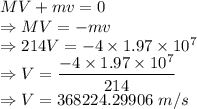
Physics, 07.04.2020 17:00, briannabarreraswestb
The nucleus of the polonium isotope 214 Po (mass 214 u) is radioactive and decays by emitting an alpha particle (a helium nucleus with mass 4 u). Laboratory experiments measure the speed of the alpha particle to be 1.97×107 m/s.
Assuming the polonium nucleus was initially at rest, what is the recoil speed of the nucleus that remains after the decay?

Answers: 3
Other questions on the subject: Physics

Physics, 21.06.2019 14:20, dondre54
Physics make-up packetname_cle14. an observer hears a sound with a frequency of 400 hz. if the speed of sound is 340 m/s, what is the wavelength of the sound? a. 0.85 mb. 1.2 mc. 2.75 m13.6 m15. as sound travels from steel into air, its speed decreases. if the frequency of the wavedoesn't change, what happens to its wavelength? a. it increases(b) it decreasesc. it remains the samed. there is not enough information given
Answers: 1

Physics, 21.06.2019 21:10, benwil0622a
State one advantage and one disadvantage of using a plane mirrior as a driving mirrior
Answers: 1

Physics, 21.06.2019 21:50, yairreyes01
Adiver in midair has an angular velocity of 6.0 rad/s and a moment of inertia of 1.2 kg·m2. he then pulls is arms and legs into a tuck position and his angular velocity increases to 12 rad/s. the net external torque acting on the diver is zero. what is his moment of inertia in the tuck position?
Answers: 1

Physics, 22.06.2019 03:30, coollid876
Imagine you are riding on a yacht in the ocean and traveling at 20 mph. you then hit a golf ball at 100 mph from the deck of the yacht. you see the ball move away from you at 100mph, while a person standing on a near by beach would observe your golf ball traveling at 120 mph (20 mph + 100 mph). now imagine you are aboard the hermes spacecraft traveling at 0.1c (1/10 the speed of light) past mars and shine a laser from the front of the ship. you would see the light traveling at c (the speed of light) away from your ship. according to einstein’s special relativity, how fast will a person on mars observe the light to be traveling? a) 0.1c (1/10 the speed of light) b) c (the speed of light) c)1.1c (c+0.1c)
Answers: 1
Do you know the correct answer?
The nucleus of the polonium isotope 214 Po (mass 214 u) is radioactive and decays by emitting an alp...
Questions in other subjects:


Spanish, 06.10.2019 15:40

Chemistry, 06.10.2019 15:40

Chemistry, 06.10.2019 15:40

Biology, 06.10.2019 15:40

World Languages, 06.10.2019 15:40

Health, 06.10.2019 15:40

Health, 06.10.2019 15:40










